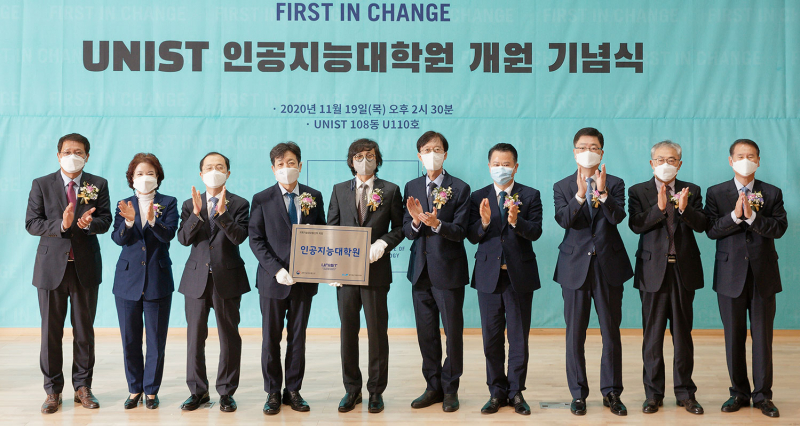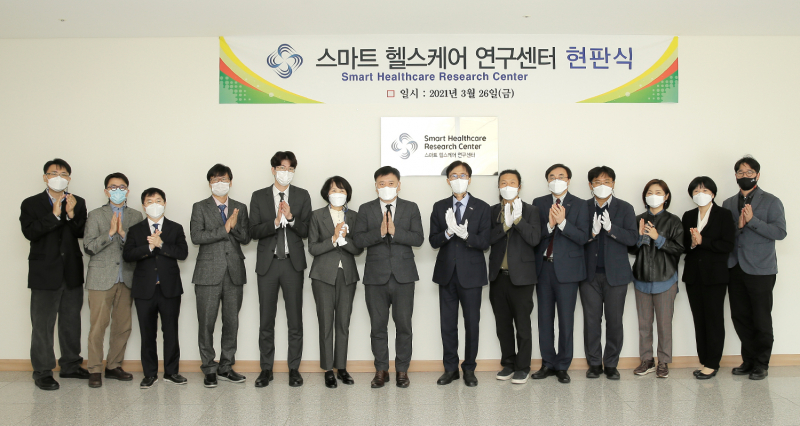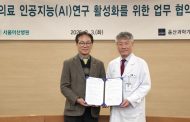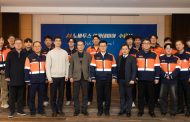UNIST will take on a challenge to change the future of Korean industries through innovation in the traditional manufacturing sectors in Ulsan. This can be achieved through the creation of the ‘National Cluster for Manufacturing Innovation,’ an innovation ecosystem that integrates the entire process from the cultivation of manpower to R&D, as well as startup development.
The key areas for manufacturing innovation are ‘Artificial Intelligence (AI)’ and ‘Carbon Neutrality’. That is to create an innovation hub to lead the future industries through the implementation of smart factories by incorporating AI into the existing manufacturing industries and through the low-carbon transition of existing manufacturing processes. This can be achieved through the creation of a cluster model in the western region of Ulsan for the cultivation of core R&D manpower from UNIST, and thus apply them directly to local industrial complexes. The goal is to lead the advancement of the existing manufacturing industries and the revitalization of innovative startup businesses, as well as over the long run, to spread such changes to Busan, Gyeongnam, Daegu, and Gyeongbuk regions.

President Yong Hoon Lee held a press conference on the occasion of the second anniversary of his inauguration in Ulsan to discuss the past achievements and the future goals of UNIST. | Image Credit: Kyoungchae Kim
Since taking office in November 2019, UNIST President Yong Hoon Lee has been steadily working to foster the conditions for innovation in the traditional manufacturing sectors in Ulsan, known as the industrial capital of Korea. He emphasized UNIST’s pivotal role in leading the Digital New Deal and Green New Deal in Ulsan, as a representative institute of science and technology in the southeastern region of South Korea.
Over the past two years, UNIST has made steady progress in laying the foundation for R&D that leads to innovation in the local manufacturing industry. One way this has been done was through the creation of a forward base to promote the cultivation of manpower, R&D, and industry-academic partnerships in areas that are core of future industries, such as AI, semiconductors, bio-health, and carbon neutrality.
The first area of focus was AI. Immediately after taking office, President Lee gathered faculty members in related fields to partake in the government’s initiatives to widen the domestic talent pool in the area of AI. In April 2020, the Ministry of Science and ICT (MSIT) has announced that UNIST was added to the list of graduate schools for intensive support under the government’s AI initiatives. In the September of that year, UNIST opened the AI Graduate School, and thus laid the foundations for AI research.

The opening ceremony for UNIST AI Graduate School took place in November 2020. l Image Credit: Kyoungchae Kim
President Lee has also been working tirelessly to help disseminate the latest AI research to local industries. The AI Innovation Park, which was launched in January 2021, is at its center. Currently being participated by 65 companies, the AI Innovation Park has been actively promoting AI-related cooperation, which includes offering education for industrial engineers, industry-academia research collaboration, as well as providing support for promising startups.
Along with AI, UNIST has proven its capabilities in semiconductors, a key area of the Digital New Deal. Established in September 2021, the Graduate School of Semiconductor Materials and Devices at UNIST is the only graduate school in Korea that specialized in semiconductor materials and devices. Work is currently underway to provide the necessary services and assistance to ensure a successful entry into the semiconductor materials market, such as by enhancing the sophistication level of precision chemical industries in Ulsan. Currently, 11 companies are receiving assistance, related to process analysis.
Furthermore, UNIST has established a foothold for manufacturing innovation through the creation of new industries, as well as the establishment of various research infrastructures that lead to innovation in the existing manufacturing industries in Ulsan, which include the UNIST Center for Smart Mobility and the Smart Healthcare Research Center.

A ceremony was held to mark the official launch of the UNIST Smart Healthcare Research Center in March 2021. l Image Credit: Kyoungchae Kim
Besides, the Center for Carbon Neutral Convergence (tentative name), which is set to open early next year, will focus primarily on carbon neutrality, an area that has gained significantly more attention in recent years. The center will take the lead in mapping out strategies for R&D projects and manpower production in the following areas of next-generation energy, carbon capture, usage, and storage (CCUS), as well as policies with regard to climate change and carbon neutrality.
Meanwhile, UNIST has recently received a KRW 30 billion endowment from Duksan Group Chairman Junho Lee. This donation has been the largest since the establishment of UNIST. This is also significant, as Ulsan’s representative local company took the lead in the growth and development of UNIST, which has been a long-cherished desire of Ulsan citizens.
Chairman Lee requested UNIST to use this endowment fund towards establishing a new innovation model to revive the local economy by fostering local talents and revitalizing youth start-ups in Ulsan. “I was deeply impressed by UNIST’s efforts to open the first graduate school of semiconductor materials and devices engineering in Ulsan and take the lead in human resources training and research and development,” said Chairman Lee. “So I have decided to donate because I wanted to actively participate in this meaningful journey that will change Ulsan’s industrial landscape.”


![[2nd Anniversary of President Yong Hoon Lee’s Inauguration] Ch 2. Manufacturing Innovation](https://news.unist.ac.kr/wp-content/uploads/2021/11/President-Lee-1-800x426.jpeg)






![[2026 Matriculation] UNIST Welcomes Class of 2030!](https://news.unist.ac.kr/wp-content/uploads/2026/02/사진-박종래-UNIST-총장이-2026년-입학식사를-전하고-있다-2-190x122.jpg)
![[2026 UNIST Commencement] UNIST Confers Degrees to 883 Graduates](https://news.unist.ac.kr/wp-content/uploads/2026/02/사진-2026학년도-UNIST-졸업생들이-학사모를-위로-던지며-졸업을-축하하고-있다-1-800x413-190x122.jpg)



